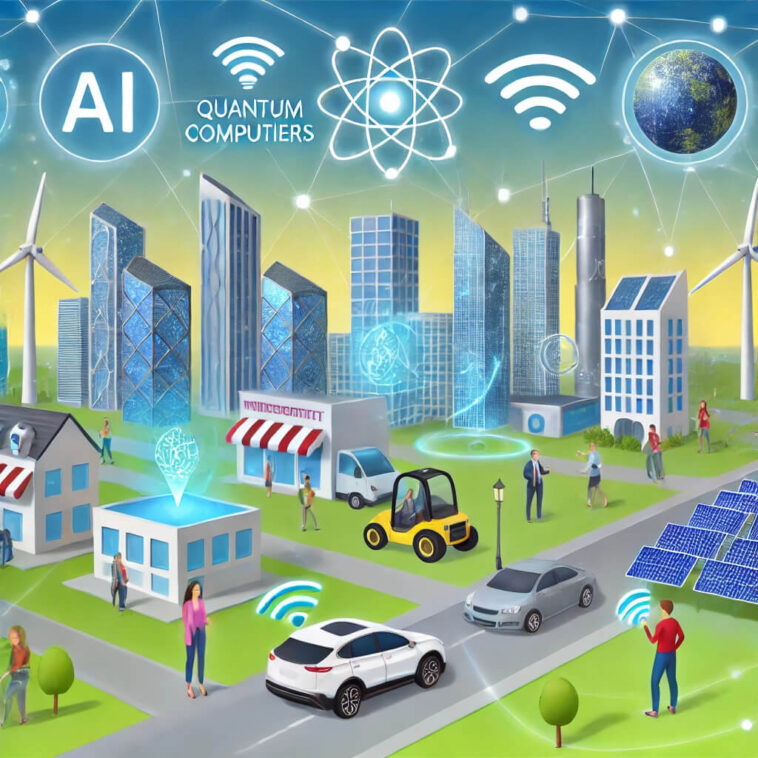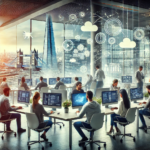As technology continues to advance at a rapid pace, its impact on business and industry cannot be overstated. The Future Predictions for Technology holds the potential to transform various sectors, from manufacturing to finance. This article explores the key trends and innovations that are expected to shape the business landscape in the coming years.
Digital Transformation
Digital transformation is the integration of digital technology into all areas of a business, fundamentally changing how businesses operate and deliver value to customers. In the future, digital transformation will become even more critical as businesses strive to stay competitive. This will involve the adoption of AI, IoT, and cloud computing to streamline operations, enhance customer experiences, and drive innovation.
Artificial Intelligence and Automation
Artificial intelligence (AI) and automation are set to revolutionize business processes. AI-powered chatbots and virtual assistants will handle customer inquiries, providing quick and efficient support. In manufacturing, automation will optimize production lines, reducing costs and increasing efficiency. Additionally, AI will enable businesses to analyze large volumes of data, providing insights that drive decision-making and strategy.
Blockchain Technology
Blockchain technology is poised to disrupt various industries by providing secure and transparent transactions. In the future, blockchain will be used to streamline supply chains, ensuring the authenticity and traceability of products. This will be particularly important in industries such as pharmaceuticals and food, where safety and quality are paramount. Additionally, blockchain will enable secure digital identities, reducing the risk of fraud and identity theft.
E-commerce and Online Retail
The rise of e-commerce has transformed the retail industry, and this trend is expected to continue in the future. Online retail will become more personalized, with AI and ML providing tailored recommendations based on customer preferences. Additionally, advancements in logistics and delivery technologies, such as drones and autonomous vehicles, will make online shopping more convenient and efficient. The integration of AR and VR will also enhance the online shopping experience, allowing customers to visualize products in their own homes before making a purchase.
Remote Work and Collaboration
The COVID-19 pandemic has accelerated the adoption of remote work, and this trend is likely to continue in the future. Businesses will invest in advanced collaboration tools and platforms to facilitate remote work and ensure productivity. Virtual offices and meeting rooms, powered by AR and VR, will enable teams to collaborate seamlessly, regardless of their physical location. Additionally, businesses will adopt flexible work arrangements, allowing employees to balance work and personal life more effectively.
Financial Technology (FinTech)
Financial technology, or FinTech, is transforming the financial services industry. In the future, FinTech will continue to drive innovation in areas such as digital payments, lending, and investment. AI-powered robo-advisors will provide personalized financial advice, making wealth management more accessible. Blockchain technology will enable secure and transparent transactions, reducing the need for intermediaries. Additionally, the rise of cryptocurrencies will provide new opportunities for investment and financial inclusion.
Supply Chain and Logistics
Advancements in technology are set to transform supply chain and logistics. In the future, IoT devices will provide real-time visibility into supply chains, allowing businesses to track inventory and shipments with precision. AI and ML will optimize supply chain operations, reducing costs and improving efficiency. Autonomous vehicles and drones will revolutionize logistics, enabling faster and more reliable delivery of goods. Additionally, blockchain technology will ensure the transparency and security of supply chain transactions.
Sustainable Business Practices
As environmental concerns continue to grow, businesses will increasingly adopt sustainable practices. In the future, technology will play a crucial role in promoting sustainability. Renewable energy sources, such as solar and wind, will power business operations, reducing carbon footprints. IoT devices will monitor and optimize energy consumption, ensuring efficient use of resources. Additionally, businesses will invest in sustainable supply chains, sourcing materials responsibly and reducing waste.
Customer Experience
Providing exceptional customer experience will remain a top priority for businesses in the future. AI and ML will enable businesses to understand customer preferences and behavior, providing personalized experiences. Chatbots and virtual assistants will handle customer inquiries, ensuring quick and efficient support. Additionally, AR and VR will create immersive experiences, allowing customers to interact with products and services in new and engaging ways. Businesses will also leverage social media and digital marketing to connect with customers and build brand loyalty.
Data Security and Privacy
With the increasing reliance on digital technology, data security and privacy will be paramount. In the future, businesses will adopt advanced cybersecurity measures to protect against cyber threats. AI and ML will detect and respond to threats in real-time, ensuring the security of business operations. Additionally, businesses will implement data privacy policies and practices to protect customer information. Blockchain technology will provide secure and transparent transactions, ensuring trust and confidence in digital interactions.
This post was created with our nice and easy submission form. Create your post!




Comments
0 comments